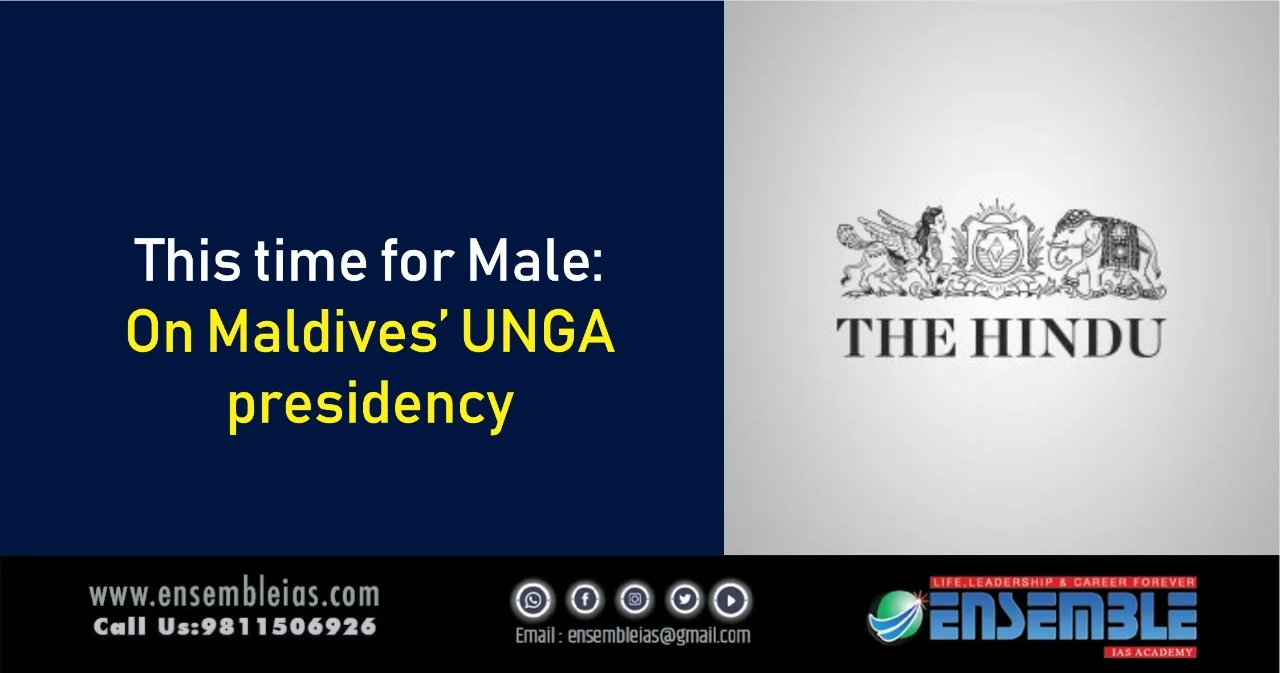This time for Male: On Maldives’ UNGA presidency
This time for Male: On Maldives’ UNGA presidency: Maldives and India have an opportunity to work for changing power structures at the UN
To buy our online courses: Click Here
The election of Maldives Foreign Minister Abdulla Shahid as the President of the 76th session of the United Nations General Assembly, that begins in September for 2021-22, is a major boost for the island-nation’s international profile. The election marks the first time a Maldivian will hold the post in the UN’s history, and his margin of victory, 143 to his challenger’s 48, indicating support from nearly three fourths of all countries at the UN, is significant. Maldives also sees it as a win for the 52-member Small Island Developing States (SIDS), which are battling climate change vulnerability and other developmental challenges. In addition, in a year when events in Afghanistan will draw attention as U.S. forces begin to pullout, Mr. Shahid’s victory over his surprise opponent, former Afghanistan Foreign Minister Zalmai Rassoul, is remarkable. For India too, that helped Maldives canvass support, the outcome is welcome, not only because of its close ties with Male but also the high regard for Mr. Shahid, a key member of the Solih government. In a break from the norm of not announcing one’s choice for an election by secret ballot, Foreign Secretary Harsh Shringla had announced India’s support for the Maldives in November 2020, South Block’s explanation being that Afghanistan had not yet announced Mr. Rassoul’s candidature — which it did in January 2021. New Delhi should now ensure that the Afghan government carries no hard feelings, as some in Kabul had even hinted that India might wish to support Afghanistan as it had sacrificed its turn at the UNSC for India’s current term there. It would also be important to analyse why Kabul decided to field a candidate late in the race, and not withdraw despite it being clear that its South Asian neighbour was ahead, and did not consult India closely on the process.
The focus now shifts to his tenure and South Asian issues such as the impact of the coronavirus pandemic and equitable access to vaccines. Cooperation is close and Mr. Shahid is in discussions to appoint an Indian diplomat as his chief aide. Given that the previous President of the General Assembly, from Turkey, had ruffled feathers with his remarks in Islamabad that Pakistan was “duty” bound to raise the Jammu and Kashmir dispute “more strongly” at the UN, Mr. Shahid’s tenure is expected to see a far smoother term for India, especially as the Modi government focuses on showcasing the country at the UN during India’s 75th Independence anniversary next year. Above all, it is hoped that India in the UNSC and the Maldivian President of the General Assembly will work in tandem as New Delhi pursues its goals for multilateral reform, and re-energise the dormant process of effecting change in the old power structures in the global body.
Also Read: In the digital era, the rise of techno-feudalism




